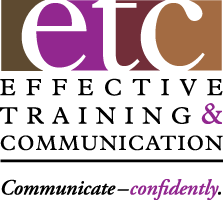Why don’t business professionals write more effectively? Many reasons. I spend a lot of time working with clients in workshops and coaching engagements, helping them take away some of the pain they experience – and often cause – with workplace writing. They start out defining effective business writing, which is neither new, trendy nor complicated. Seems like everything old is new again. And they always get what it is, using descriptive terms like clear, easy to read, concise, simple, focused, etc.
We then discuss why most people don’t write that way now, given that they seem to know what effective business writing looks like. Here’s a summary of the typical reasons they identify – it’s easy to blame these reasons and conclude that it’s not your fault:
- We didn’t learn how to write for the contemporary workplace while in school. Yes, we all learned how to write sentences, paragraphs and term papers in school, but the focus was on traditional, formal structure and syntax and flaunting what we perceived to be a sophisticated vocabulary. Most business people I encounter were able to avoid taking a business writing course in college or the one they did take was taught by an academic with no relevant workplace experience.
- We didn’t like writing in school, so why should we like doing it at work. And most people have difficulty justifying the time and effort to do well those things they don’t like. It’s a chore, something we must do and certainly not fun.
- We let the business culture and values influence our writing attitudes and style. Unless we work as journalists or marketing copywriters, most people didn’t have to take a writing test to get a job. And few if any have ‘effective written communication’ as an important component of their performance objectives and evaluation criteria. We can easily conclude that if something isn’t in our performance objectives or job description, it must not be important.
- We’re influenced by those around us. If our bosses and colleagues are ineffective writers, that often rubs off. What’s even worse is the situation where a person with effective writing skills joins a work group with weak skills and attitudes that indicates ‘this is how we do it here.’ That person then goes along with the flow and becomes a weaker writer as a result.
- We have other priorities for our time. People struggles with too much on their plates and not enough time to do everything well. The important things get the quality time and, obviously, writing really well isn’t one of them.
- We let our attitudes get in the way. If we grew up believing that a having a large vocabulary or using big or fancy words impressed people with our level of education and sophistication, that attitude shows up in how we write at work. Same goes for thinking that a formal writing style equaled ‘professional’ and, therefore, an informal style equaled ‘unprofessional’.
If you want to rid yourself of the guilt caused by your less than effective workplace writing, point to one or more of these reasons and proclaim ‘It’s not my fault! It’s not MY fault!’ There now … don’t you feel better? That was easy … just blame all those past or present factors that negatively influenced you.
But, before you become too comfortable with your new-found reduced level of guilt, you must accept the reality that you do know better. You do know how to effectively write in the contemporary, business-casual workplace – in a manner that is clear, easy to read, concise, simple, focused, etc. Said another way – with a reader-centric and results-driven approach that is Effective, Efficient and Engaging!
So, through yesterday, it wasn’t your fault. But, from today on – it is your fault. To keep from taking another guilt trip, keep striving to enhance your skills … and no more blame game!
